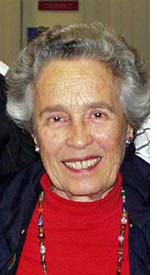By Eileen Wingard

SAN DIEGO — Awaiting the performance of Victor Ullmann’s one-act opera, Der Kaiser Von Atlantis, on Friday evening, June 2, I recalled the other performances in San Diego of music created in the Nazi’s Show Ghetto of Terezin.
On February 5, 1989, at the 54th Street Jewish Community Center, the JCC Music Committee presented a program, Composers of the Terezin Concentration Camp, featuring works by Gideon Klein, Carlo S. Taube, Viktor Ullmann and Ilse Weber. It was introduced by one of the poems written by a child in Terezin, “Concert in the Old School Garret.” That concert was performed by Emilie Berendsen, mezzo soprano and music professor at the University of Washington, Seattle, her husband David Bloch, piano, music professor at Tel Aviv University and founder of the Terezin Music Memorial Project, and three San Diego Symphony Orchestra musicians performing Gideon Klein’s String Trio.
During the tenure of the Israeli conductor, Yoav Talmi, a concert in memory of the Holocaust was presented which included the slow movement from Klein’s String Trio, Variations on a Moravian Folksong, arranged for string orchestra by Yoav Talmi.
As part of the 2006 San Diego Jewish Music Festival, my sister, violinist Zina Schiff played a recital modeled after the recitals performed by Karel Froelich in Terezin. He was recognized as the most talented violinist in the ghetto. Froelich survived the war and became concertmaster of the the Prague Opera Company. One of the works Zina programmed was Serenata by Robert Dauber, a cellist-composer, who, like Ullmann, was killed in Auschwitz.
The next evening, we had a panel with local survivors who had been interned in Terezin. Lily Greenberg and Eve Wertheimer recalled their time in Terezin, the malnutrition, the diseases, the overcrowded conditions, and, dispite all, the high level of culture and learning.
In recent years, the J Company, under the direction of Joey Landwehr, presented the childrens’ opera Brundibar by Hans Krasa, a work performed 55 times in Terezin.
The Miryam Quartet has performed works by Terezin composers at several Holocaust Memorial programs at the Lawrence Family JCC, Congregation Beth Israel, and at Slichot programs at Temple Emanu-El, Tifereth Israel and at Congregation Adat Shalom. The quartet performed works by composers Zikmund Schul, Gruenfeld and Frantisek Domazlicky.
But the composer who was recognized as the man with the most talent, a man who had studied with Arnold Schoenberg, served as assistant conductor of the New German Theater in Prague, held the post of music critic for the German music journal, Der Auftakt, was Victor Ullmann. He was interned in Terezin in September, 1942 and appointed the camp’s official music critic. From his insightful reviews, we learn a great deal about the cultural life of Terezin. During his two years there, he completed several piano sonatas, a string quartet, songs, and the opera Der Kaiser von Atlantis.
It is fitting that this opera, Ullmann’s masterpiece, should be performed in a venue which attracts the general community at large. Its message is universal, its music, of the highest quality.
Stephen Schick, SDSU Distinguished Music Professor and Music Director of the La Jolla Symphony and Chorus, is to be congratulated for undertaking this challenging project and bringing it to such splendid fruition.
All seven singers were outstanding. Particularly impressive for his vocal range and his acting was bass-baritone Philip Larson as Death. Vince B. Vincent was Kaiser Overall, Ryan Reithmeier was Die Lautsprecher, Riffany Du Mouchelle was Der Trommler, Alice Teyssier was Harlekin, Bonnie Lander was Bubikopf and Gerald Seminatore was the Soldat.
The orchestra, which included two violins, viola, cello, bass, flute, oboe, clarinet, saxophone, trumpet, guitar, banjo, cembalo, piano, synthesizer and percussion, achieved some unusual sonorities with this unorthodox instrumentation. The music ranged from atonal and strident to pleasingly harmonious in the love scene between the soldier and the enemy maiden. Quoted were passages from “Deutchland Ueber Alles,” “Schlaf Kindlein, Schlaf,” and a familiar Protestant hymn.
This opera was never performed in Terezin. During rehearsals, an SS man came by and called everything to a halt. Ullman and his family were murdered in Auschwitz in 1944.
*
Wingard, a retired violinist with the San Diego Symphony, is a freelance writer. She may be contacted at eileen.wingard@sdjewishworld.com
Pingback: Latest Alice Violin Strings News | violin - Your personal entertainer
Shalom, Eileen,
I always enjoy reading your articles in the SDJW, and especially this one. You’ll understand why if you read my latest post ‘Defiant Requiem,’ about a performance of Verdi’s Requiem as played in Theresienstadt. You can find it at: http://fromdorothea.wordpress.com
Best wishes,
Dorothea